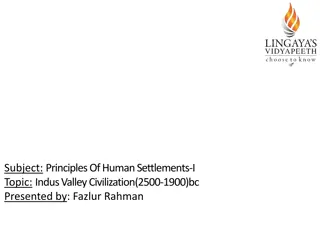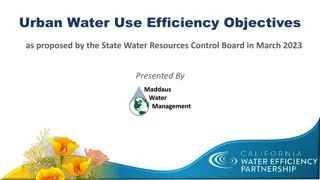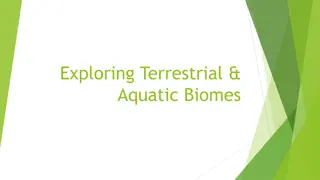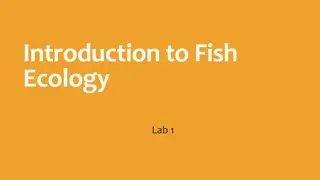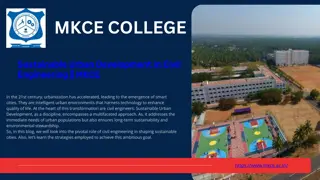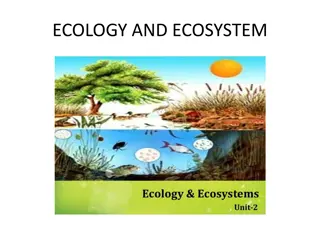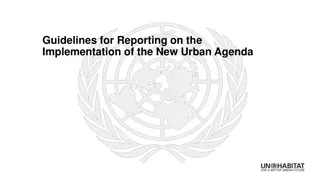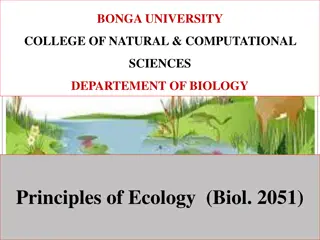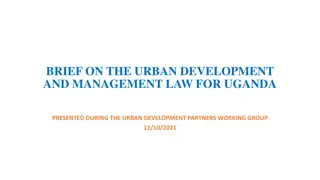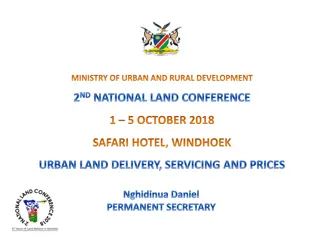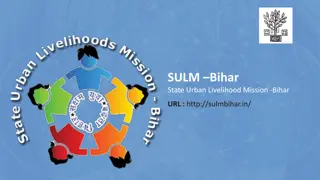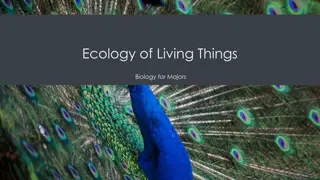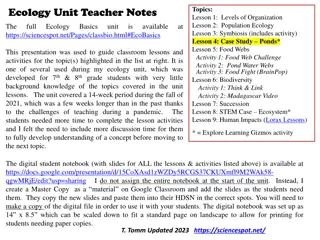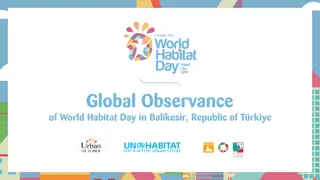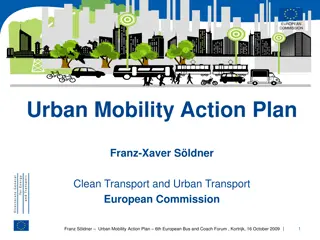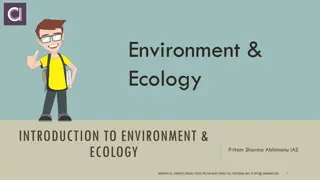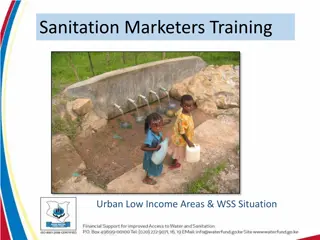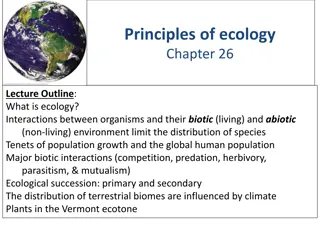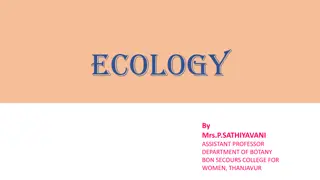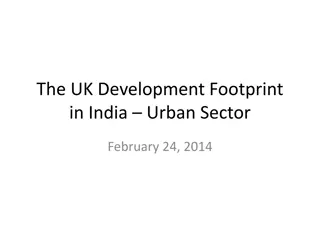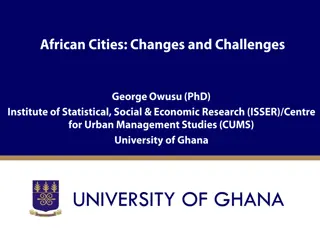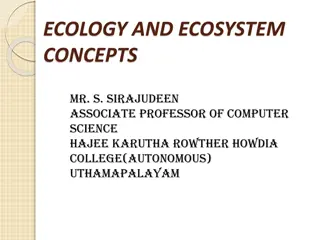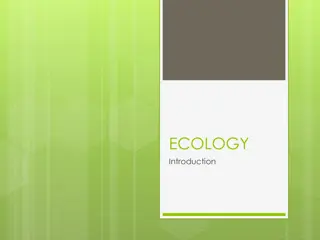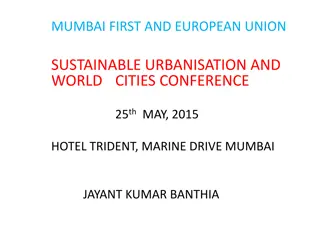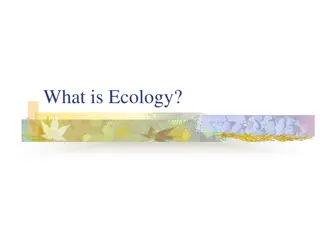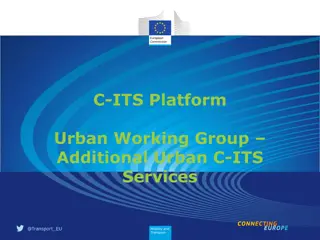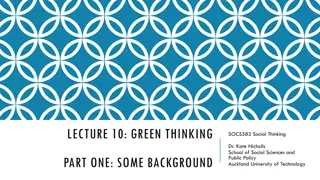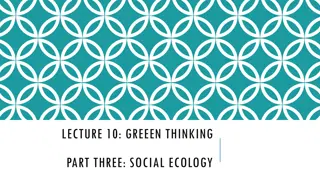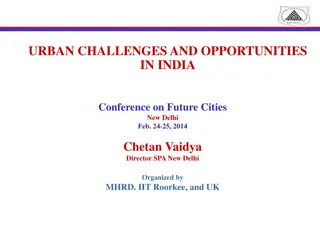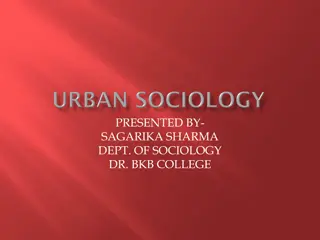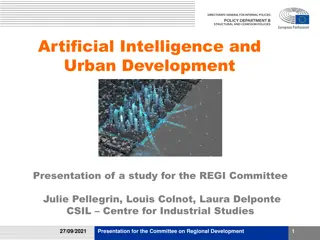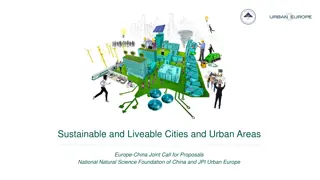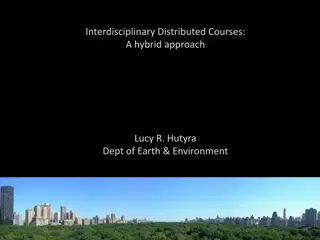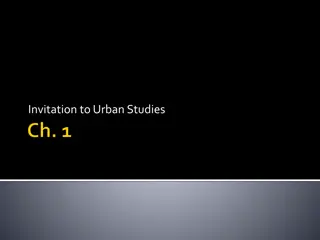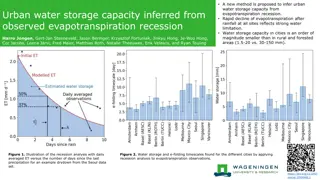Enhancing Urban Resilience in BRICS through Integrated Infrastructure and Sustainable Development
Dr. George Tsibani discusses the importance of water resilience, sustainable development goals, and the role of BRICS in fostering smart cities and rural-urban integration. The focus is on building resilience in urban water systems for economic growth and societal well-being. Solutions are proposed
1 views • 14 slides
Understanding Ecology: Interactions Between Organisms and their Environment
Ecology is the scientific study of how living organisms interact with each other and their environment. It delves into the relationships between biotic and abiotic factors, encompassing topics such as the distribution and abundance of organisms, structural adaptations, behavior under natural conditi
2 views • 42 slides
Urban Development Models: Burgess and Hoyt
The Burgess concentric ring model and Hoyt sector model are key frameworks explaining urban social structures. Burgess's model illustrates urban land use in rings around the CBD, while Hoyt's model emphasizes outward growth along transportation arteries. Criticisms include applicability limitations
5 views • 13 slides
Dallas Comprehensive Urban Agriculture Plan Summary
Dallas's Comprehensive Urban Agriculture Plan focuses on promoting urban agriculture to ensure all communities have access to healthy, local food. The plan includes strategies to reduce regulatory barriers, support land access, provide education and resources, facilitate partnerships, and build mark
6 views • 7 slides
State Water Resources Control Board's Urban Water Use Efficiency Objectives
The State Water Resources Control Board proposed Urban Water Use Efficiency Objectives in March 2023 to address the challenges of a hotter, drier future. The objectives include creating storage space for up to 4 million acre-feet of water, recycling and reusing at least 800,000 acre-feet of water pe
0 views • 32 slides
Understanding Ecosystems: Ecological Interactions and Dependencies
Ecology is the study of how organisms interact with their environment, influencing their distribution and abundance. This exploration covers terrestrial and aquatic biomes, energy flow, environmental impacts, adaptations, and global ecosystems, emphasizing the interconnectedness of all living organi
2 views • 58 slides
Understanding Fish Ecology: Interactions, Diversity, and Environmental Factors
Fish ecology involves studying the distribution, interactions, and abundance of fish species in different ecosystems. This lab delves into the divisions of ecology, fish species diversity in marine and freshwater ecosystems, and the environmental factors affecting fish diversity and abundance. Disco
1 views • 7 slides
Sustainable Urban Development in Civil Engineering MKCE
In the 21st century, urbanization has accelerated, leading to the emergence of smart cities. They are intelligent urban environments that harness technology to enhance quality of life. At the heart of this transformation are civil engineers. Sustainable Urban Development, as a discipline, encompasse
0 views • 2 slides
Understanding Ecology and Ecosystem: A Comprehensive Overview
Ecology, derived from the Greek word "oikologie," explores the interactions between organisms and their environment. The study encompasses various branches like human ecology, population ecology, and habitat ecology, focusing on the relationships within ecosystems. An ecosystem, defined by A.G. Tans
1 views • 68 slides
Understanding Media Ecology: Impact of Communication Technology
Media ecology is a theoretical concept analyzing the influence of media and communication technology on human culture. Neil Postman, a prominent figure in the field, delves into how communication media affect human perception, understanding, and values. This study views media as environments shaping
4 views • 23 slides
Guidelines for Reporting on the Implementation of the New Urban Agenda
The guidelines emphasize the importance of periodic follow-up and review of the New Urban Agenda by Member States to ensure effective implementation. They stress inclusivity, transparency, and voluntary participation in tracking progress towards sustainable urban development goals. The document outl
2 views • 11 slides
Principles of Ecology: Understanding Organism-Environment Interactions
Ecology is the scientific study of how living organisms interact with each other and their environment. It involves understanding organisms at their native habitats, from individuals to ecosystems. The discipline encompasses various branches and focuses on the relationships shaping the distribution
1 views • 14 slides
Overview of Uganda's Urban Development and Management Law
Vision 2040 and National Development Plan emphasize the pivotal role of cities in Uganda's development. The absence of a legal framework for urban development led to fragmented mandates across ministries. Efforts are underway to establish a comprehensive legal framework for sustainable urban develop
0 views • 5 slides
Challenges and Solutions in Urban Land Delivery and Pricing in Namibia
The Urban Land and Housing Sector in Namibia faces significant challenges such as a backlog in land delivery, high input costs, weak urban planning, and limited institutional capacity. These issues lead to slow supply rates and affordability problems for end users. Addressing these challenges requir
0 views • 20 slides
Overview of SULM Bihar State Urban Livelihood Mission
The SULM Bihar State Urban Livelihood Mission, an initiative under the National Urban Livelihoods Mission (NULM), aims to empower urban poor households through self-employment and skilled wage opportunities. The mission focuses on poverty reduction and enhancing livelihoods sustainably by establishi
0 views • 13 slides
Understanding Ecology: Interactions and Environments in Biology
Ecology is the study of interactions between living organisms and their environment. It involves levels of research such as animal ecology, plant ecology, and more, while also exploring the biosphere's impact, biogeography, species distribution patterns, and energy sources like sunlight. Ocean upwel
1 views • 80 slides
Comprehensive Ecology Unit for Middle School Students
Engage 7th & 8th grade students in a 14-week ecology unit covering topics like levels of organization, population ecology, symbiosis, biodiversity, human impacts, and more. Utilize digital notebooks, interactive activities, and exploration tools to enhance learning and understanding. Access resource
0 views • 18 slides
Roundtable on Urban Regeneration: Social Value Creation with Diverse Speakers
The Roundtable on Urban Regeneration focuses on challenges posed by Covid-19, Climate, and Conflicts on inequalities. It explores how urban regeneration can address these challenges and create social value while reducing poverty and inequality. The event also delves into the role of the private sect
0 views • 15 slides
European Commission Urban Mobility Action Plan Overview
The European Commission's Urban Mobility Action Plan focuses on promoting sustainable urban transport to address the challenges faced by urban areas in Europe. The plan emphasizes the importance of efficient transport for economic growth, citizen concerns related to urban mobility, and the role of t
0 views • 12 slides
Impacts of Marketisation on Home Care for Older People in Urban China
This study by Wenjing Zhang from the University of Bristol delves into the effects of the marketisation process on home care for the elderly in urban China. It explores the rationale behind the marketisation of care, the trends in home care marketisation, and the processes involved. The background s
0 views • 19 slides
Introduction to Ecology and Environment Studies
Ecology is the study of the relationship between organisms and their environment, while the environment refers to the surroundings that influence living organisms. The biosphere is divided into the atmosphere, lithosphere, and hydrosphere. Terms in ecology include species, populations, communities,
0 views • 13 slides
Target Areas for Sanitation Marketers Training in Urban Low-Income Areas
Target areas for sanitation marketers training in urban low-income areas include informal settlements, planned urban areas with low-income housing, informal housing in planned residential areas, urban IDP settlements, and urban sub-centers. These areas present challenges with water supply and sanita
0 views • 18 slides
Exploring Ecology: Interactions, Distribution, and Population Dynamics
Ecology delves into the relationships between organisms and their environment, understanding factors that limit species distribution, major interactions like competition and predation, as well as population growth patterns. This includes the influence of biotic and abiotic factors, ecological succes
0 views • 30 slides
Understanding Ecology: Key Concepts and Types Explained
Ecology, a vital branch of science, delves into the relationships between organisms and their environment. It encompasses biotic and abiotic factors, studying how living and non-living elements interact within ecosystems. Biotic components include living organisms like plants and animals, while abio
0 views • 7 slides
UK Development Footprint in India Urban Sector - Towards Smart Urbanisation
The UK has been engaged in the urban sector in India for over 30 years, focusing on slum infrastructure development initially and transitioning towards sustainable development and smart urban growth. The emerging priority is smart urbanisation, aiming to build inclusive and climate-resilient cities
0 views • 10 slides
Understanding African Urbanization: Challenges and Trends
Unpacking the narratives of African urbanization and cities, this collection explores Africa's unique urban revolution, urban challenges, and the prevalence of informality in its cities. Data and projections highlight the evolving urban landscape across different regions in Africa, emphasizing the s
0 views • 14 slides
Ecology and Ecosystem Concepts: Understanding Interrelationships in Nature
Ecology explores the interconnections between living organisms and their environment, dating back to zoologist Geoffroy St. Hilaire's early proposal in 1859. The term "ecology" originates from the Greek words for house and discourse, emphasizing the study of organisms within their habitat. Ecosystem
0 views • 36 slides
Exploring Ecology: Interactions and Environments
Dive into the world of ecology, where organisms interact and rely on each other and their surroundings. Understand the concepts of populations, communities, ecosystems, biomes, and the biosphere. Explore the vocabulary of ecology, from individual organisms to entire biomes. Learn about food chains,
0 views • 14 slides
Urbanization in India: Trends and Challenges
The urban population in India has seen significant growth over the years, reaching 31.30% in 2011. However, urbanization in India faces challenges such as lopsided growth, lack of industrialization, and issues with rural-urban migration. Despite this, India has a dispersed urban population, with var
0 views • 21 slides
Understanding Ecology: Interactions in the Environment
Ecology, originating from the Greek words "Oikos" and "Logos," is the study of interactions between living and non-living components in the environment. It encompasses the relationships between plants, animals, microorganisms, and abiotic factors like light, water, nutrients, and atmosphere. Studyin
0 views • 16 slides
Urban C-ITS Services for Enhanced Mobility and Transport Management
Urban C-ITS (Cooperative Intelligent Transport Systems) Working Group discusses additional services for improving mobility and transport in urban areas. Outcomes of meeting 1 include various C-ITS services like traffic signal priority, green light optimization, traffic information, and more. The cat
0 views • 24 slides
Exploring Green Thinking: Societal Perspectives on Environment and Ecology
Delve into the realm of green thinking through the eyes of social sciences in this lecture by Dr. Kate Nicholls at Auckland University of Technology. The discourse ranges from traditional Western views on nature to the rise of the green movement, including discussions on deep ecology, social ecology
0 views • 9 slides
Exploring Social Ecology and Anarchism: A Path to Sustainable Future
Social ecology emphasizes the interconnectedness between social issues and environmental problems, advocating for a society without domination or centralized control. Anarchism, often associated with social ecology, critiques hierarchy and promotes cooperation. The affinity between feminism and ecol
0 views • 8 slides
Urban Challenges and Opportunities in India: Strategies for Future Cities
This content discusses the urban challenges and opportunities in India, focusing on population trends, urban initiatives, and the Jawaharlal Nehru National Urban Renewal Mission (JNNURM). It emphasizes the need for sustainable, inclusive, and smart cities with strategies such as improving urban gove
0 views • 8 slides
Understanding Urban Sociology: A Comprehensive Overview
Urban sociology explores the dynamics of city life, urbanization, and urban communities. It delves into the origin and development of cities, social structures, family dynamics, class struggles, urban issues, and more. Key elements include population density, family structures, occupations, social h
0 views • 6 slides
Role of Artificial Intelligence in Urban Development: Study Presentation for the REGI Committee
Explore the implications of AI in urban development, addressing key definitions, expected benefits, potential risks, enabling conditions, and EU policy. Emphasize the importance of governance in implementing AI in urban contexts, highlighting benefits like improved urban management, economic opportu
0 views • 14 slides
Europe-China Joint Call for Sustainable Urban Development
This joint initiative between JPI Urban Europe and NSFC aims to promote research projects focusing on sustainable and liveable cities in both Europe and China. With a budget of 9.35 million euros on the European side, the call seeks to address key urban challenges such as economic transformation and
0 views • 21 slides
Interdisciplinary Distributed Courses: A Hybrid Approach Experiment in Urban Ecology
Explore the innovative approach of interdisciplinary distributed courses through an experiment in urban ecology. This hybrid model involves parallel, distributed teaching on various disciplines to address urban ecosystem challenges. The experiment utilized a 3-hour teaching block, video guest lectur
0 views • 18 slides
Insights into Urban Studies: Sociological Variables and Cultural Influences
Delve into the world of urban studies, exploring how urban sociology investigates systematic causes and effects on people in urban environments. Discover the challenges of defining 'urban,' understanding informal city structures, and navigating public spaces. Uncover the cultural influences of citie
0 views • 12 slides
Inference of Urban Water Storage Capacity from Evapotranspiration Recession Analysis
A new method is proposed to estimate urban water storage capacity based on evapotranspiration recession analysis, showcasing the significant differences between urban and rural/forested areas. The study highlights the strong water limitations in cities, leading to smaller water storage capacities. F
0 views • 4 slides


